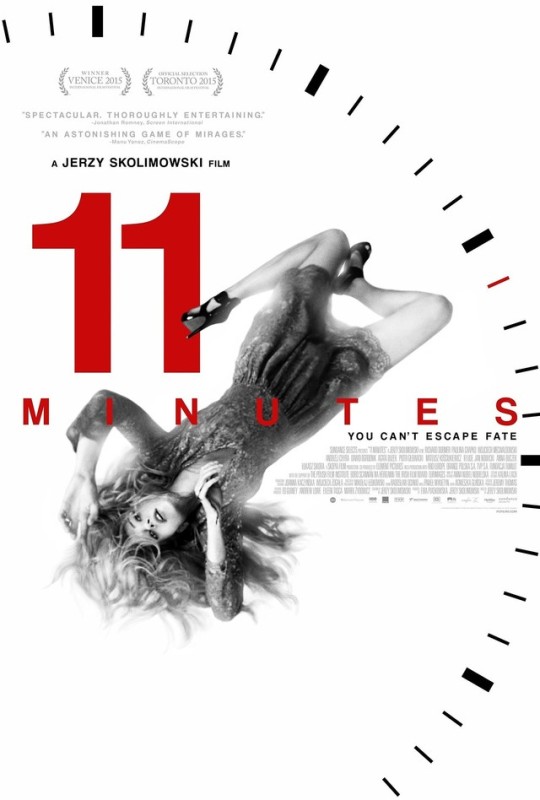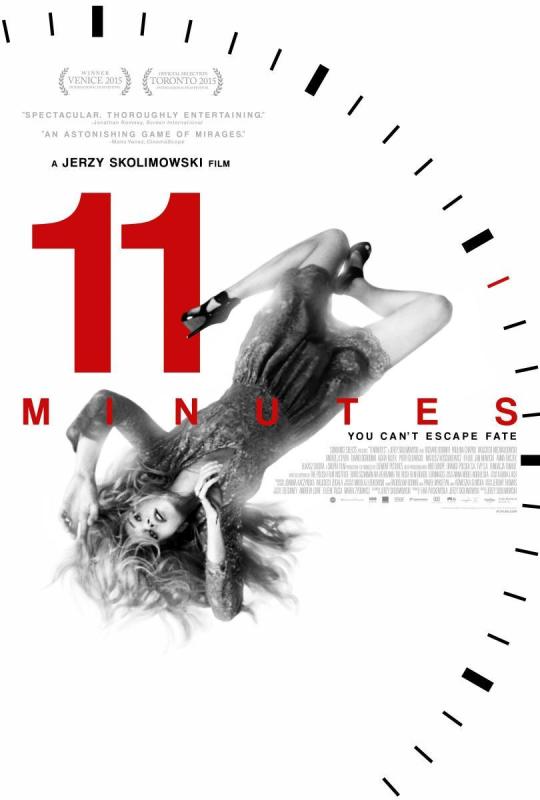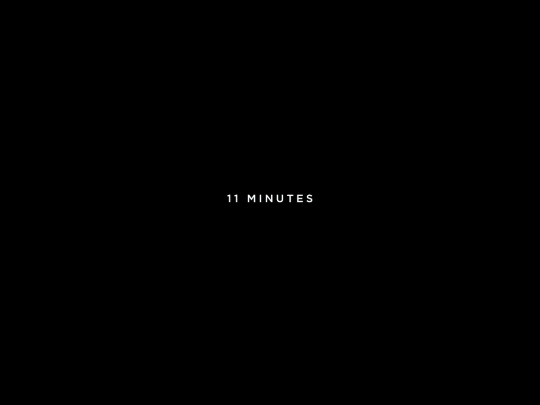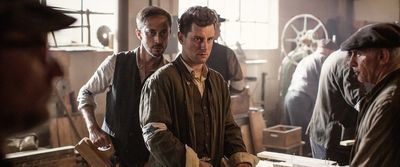#piotr glowacki
Text
Download [18+] Pokusa (Temptation) (2023) UNRATED Polish Full Movie 480p | 720p WEB-DL
Download [18+] Pokusa (Temptation) (2023) UNRATED Polish Full Movie 480p | 720p WEB-DL
Film Details :
Full Name: Pokusa (Temptation)Cast: Helena Englert, Andrea Preti, Piotr Glowacki, Piotr Stramowski, Ewa Lewandowska, Joanna LiszowskaLanguage: PolishReleased Year: 2023Quality: 720pSize: 550MBSource: WEB-DLGenre: Erotic, Hot, RomanceFormat: MKV
: Storyline/PLOT :
Inez is a young, aspiring…

View On WordPress
0 notes
Text
Fight For Hope In The Champion of Auschwitz UK Trailer
Fight For Hope In The Champion of Auschwitz UK Trailer
76 years after World War II, we’re still learning about the horrific stories, stories of bravery about the war. In September we watch The Champion of Auschwitz, the incredible true story of the boxing champ who fought for his life in Auschwitz.
Today Parkland Entertainment has released the Official UK Trailer which you can check out below.
The film is directed by Maciej Barczzewski who is the…

View On WordPress
0 notes
Video
youtube
Zula (played by Joanna Kulig) sings Dwa Serduszka (AKA Two Hearts, Four Eyes) in a clip from Zimna wojna (Cold War, dir. Pawel Pawlikowski, 2018)
#polish cinema#pawel pawlikowski#joanna kulig#tomasz kot#marcin masecki#lukasz zal#janusz glowacki#piotr borkowski#ivana patricia dilas ceranic#benoît barouh#jaroslaw kaminski#katarzyna sobanska strzalkowska#marcel slawinski#ola staszko#anna woloszczuk#waldemar pokromski#magdalena malisz#judyta pieprzyk#tadeusz sygietynski#mira ziminska#ewa puszczynska#tanya seghatchian#zimna wojna#cinema
38 notes
·
View notes
Photo










Cold War (2018)
“Let’s go to the other side. The view will be better there.”
Country: Poland / UK / France
Directed by: Pawel Pawlikowski
Written by: Pawlikowski, Janusz Glowacki & Piotr Borkowski
Story by: Pawlikowski
Cinematography by: Lukasz Zal
Edited by: Jaroslaw Kaminski
Produced by: Tanya Seghatchian & Ewa Puszczynska
Music by: Marcin Masecki
Production Design by: Marcel Slawinski, Katarzyna Sobanska-Strzalkowska & Benoît Barouh
#Cold War#Movie#Poland#United Kingdom#France#Pawel Pawlikowski#Janusz Glowacki#Piotr Borkowski#Lukasz Zal#Jaroslaw Kaminski#Tanya Seghatchian#Ewa Puszczynska#Marcin Masecki#Marcel Slawinski#Katarzyna Sobanska-Strzalkowska#Benoît Barouh#Amazon Studios#2010s#Romance#Drama#Music#History#Historical Drama#Period Drama
2 notes
·
View notes
Photo

#520 #Zimna Wojna (Cold War)
#Zimna wojna#Cold War#Oscar#Pawel Pawlikowski#Janusz Glowacki#Piotr Borkowski#Joanna Kulig#Tomasz Kot#Borys Szyc#Agata Kulesza#Cédric Kahn
4 notes
·
View notes
Photo

7.5/10
0 notes
Text

Cold War 2018
Director: Pawel Pawlikowski
Writers: Pawel Pawlikowski, Janusz Glowacki, Piotr Borkowski
Filmin süresiyle mi ilgili bilmiyorum, ben aşk hikayesine tam giremedim. Bu hikaye okumayı sevmemem daha doğrusu yoğunlaşamadığımdan dolayı kısalık beni olumsuz etkiliyor. Görüntü tabiki de harika. Olağanüstü hatta. Ida filmi gibi, siyah beyaz. Aslında Ida filminde de böyleydi hikaye birden varoluyor ve ilerliyor. Yönetmen böyle seviyor olabilir. 1950 ler Polonya, Fransa, Berlin. O zamanlar dünyanın durumu nasıldı? Yeni bir savaştan çıkılmış. Halk türküleri var . Ve bir de tutunamama. Kesinlikle. Fransa da o çift tutunamıyor bence. Aşklarını her şeyden üstün tuttukları için mi? Bu şimdi aklıma geldi. Bir plağınızın çıkması aşkınızdan önemli midir?
12 notes
·
View notes
Photo

イレブン・ミニッツ
2015年製作
原題 11 minut
監督 イエジー・スコリモフスキ
約80分の作品の中で11分間の出来事を様々な目線で描いた作品。
展開は、ラストシーンを見せるための長いフリといった感じ。最後の最後で謎を残しつつ、細かい説明や伏線は回収しない。知りたきゃ自分で考えなってパターン。
面白いんだけど、序盤から引き込まれるように観たから多少肩すかしを食らった印象。
★★★: Fair (satisfaction: 40%-60%)
#11 minut#11 minutes#jerzy skolimowski#richard dormer#paulina chapko#wojciech mecwaldowski#andrzej chyra#dawid ogrodnik#agata buzek#piotr glowacki#anna maria buczek#jan nowicki#lukasz sikora#ifi ude#mateusz kosciukiewicz#grazyna blecka-kolska#janusz chabior#2010s#fair
0 notes
Text
Cold War - Critique [KVIFF2018]
Critique de Cold War lors du KVIFF 2018
1h28min | 24 octobre 2018 (France)
Réalisateur: Pawel Pawlikowski
Scénario : Pawel Pawlikowski, Janusz Glowacki & Piotr Borkowski
Casting : Joanna Kulig, Tomasz Kot, Borys Szyc, Jeanne Balibar, Cédric Kahn
Synopsis: Pendant la guerre froide, entre la Pologne stalinienne et le Paris bohème des années 1950, Wiktor, un musicien épris de liberté et Zula, une jeune chanteuse passionnée vivent un amour impossible dans une époque impossible.
Après Ida (Oscar du meilleur film en langue étrangère), Pawel Pawlikowski revient avec un magnifique portrait en noir et blanc au cœur de la Pologne. Il filme avec musique l’amour passionnel et impossible entre Zula et Wiktor à travers les années tout en voyageant à travers l’Europe. Une femme et un homme au lien indéfectible jusqu’à l’impossible. Le réalisateur dédie son film à ses parents dont l’histoire est intimement lié aux protagonistes.

Le talent de Joanna Kulig et Tomasz Kot est indéniable et leur alchimie est aussi bien enivrante, bouleversante que charnelle, passionnelle. Leur amour vibre au son d’une musique d’une émotion palpable à chaque note. Le noir et blanc ainsi que le format subliment leurs visages en capturant chaque seconde d’émotion.
Pawlikowski nous fait part d’un monde entravant la liberté au cœur d’une guerre froide impitoyable. Un film à voir absolument.
Cold War a été récompensé du prix de la mise en scène à Cannes en mai dernier. Il représente la Pologne pour les nominations à l'Oscar du meilleur film en langue étrangère, sans oublier sa présence aux European Film Awards avec cinq nominations.
Bande-annonce : https://www.youtube.com/watch?v=ezrzrPWUgrc
youtube
#news#critique#reviews#cold war#pawel pawlikowski#pologne#oscars#joanna kulig#tomasz kot#festival#karlovyvary#kviff
7 notes
·
View notes
Photo


CALIFICACIÓN PERSONAL: 6 / 10
Título Original: 11 minut
Año: 2015
Duración: 81 min
País: Polonia
Director: Jerzy Skolimowski
Guion: Jerzy Skolimowski
Música: Pawel Mykietyn
Fotografía: Mikolaj Lebkowski
Reparto: Richard Dormer, Agata Buzek, Andrzej Chyra, Dawid Ogrodnik, Beata Tyszkiewicz, David L. Price, Piotr Glowacki, Jan Nowicki, Wojciech Mecwaldowski, Paulina Chapko, Anna Maria Buczek
Productora: Skopia Film, Element Pictures
Género: Drama, Thriller
https://www.imdb.com/title/tt3865478/
TRAILER:
youtube
0 notes
Text
Cold War (2018)

Directed by: Pawel Pawlikowski // Written by: Pawel Pawlikowski and Janusz Glowacki, Piotr Borkowski // Starring: Joanna Kulig, Tomasz Kot, Borys Szyc, Cédric Kahn, Agata Kulesza
I thought this was alright. It actually reminded me a lot of A Star is Born and, looking back, I think almost everything I wrote about that movie, if you take out the part about Bradley Cooper, applies here. Solid and technically impressive, but also a little old-fashioned and difficult for me to connect with personally. Honestly, I’m really happy to be done with this year’s Oscar contenders. As I mentioned when speaking about BlacKkKlansman, I’m not sure why it is, but nothing from this year particularly impressed me. Maybe it was an objectively weak year, maybe my taste has gnarled into something utterly disconnected from general critical consensus, or maybe I’m in a depressive funk that renders true enjoyment and connection impossible. I don’t know. But I’m happy to be done with my self-imposed obligation to watch all the movies from the major categories. Whatever I watch from now on will be because I actually want to see it, or because I’ve been worn down by a terse, two hour negotiation with my family on a Saturday night in which we ultimately settle on something no-one really cares about. As God intended.
0 notes
Text
Who Will Write Our History

The best historical films, nonfiction or otherwise, are the ones that immerse us so completely in their time period that we become lost in them. Many directors I admire—such as Michael Haneke, Terry Gilliam and László Nemes—have criticized Steven Spielberg’s 1993 landmark, “Schindler’s List,” for focusing on survivors of the Holocaust rather than the six million who perished. Yet every time I watch the film, I am profoundly shaken by its portrayal of self-righteous evil. The sense of loss is palpable because we are made to share in each victim’s bewilderment as their life reaches a sudden and deplorable end. Janusz Kaminski’s visceral cinematography and John Williams’ restrained score place us directly inside the horror. There are hundreds of wrenching human vignettes weaved within the central narrative, and as in many of the great film epics, they resonate far more than any sequence involving the lead character himself. When I first saw the picture in junior high, I had to walk around in the sunlight for hours afterward, as if to affirm for myself that I was no longer in Auschwitz.
Roberta Grossman’s latest documentary, “Who Will Write Our History,” has an equally shattering and inspiring story to tell, yet its style continuously holds us at arm’s length. Produced by Nancy Spielberg (sister of Steven), the picture unearths an archive of Jewish experiences under Nazi occupation that serve as perhaps the first precursor to her brother’s own Shoah Foundation. Named “Oyneg Shabes,” translating as “Joy of the Sabbath” to evade suspicion, this secret collection of documents compiles the testimonials of various Jewish citizens forced to live in the Warsaw Ghetto during WWII. The archive was spearheaded by Emanuel Ringelblum, a historian determined to preserve the truth of Jewish identity, thereby combating the hateful misinformation spread by Germans.
In one jaw-dropping clip of a Nazi-approved propaganda film, a schoolgirl laughs at the lice in her fellow peer’s hair, only to be corrected by her teacher, who insists that the poor student can’t help herself, considering her neighbors are Jewish. The footage then cuts to a shower room, where we see close-ups of Jewish men, who are portrayed as grotesque, disease-carrying beings. Hysteria generated by these sorts of flagrant lies fueled the division of Poland’s capital into three quadrants, separating Germans and Poles from anyone branded with a Star of David. Around 400,000 inhabitants of the ghetto were estimated to have perished prior to its demolition following a heroic uprising in 1943, and only two contributors to the archive survived to see the end of the war.
One of them was Rachela Auerbach, a veteran journalist and critic who wrote extensively on the position of women in society and the double exclusion she experienced as a result of her gender and ethnicity. She’s an enormously fascinating figure worthy of her own film, and there are times when Grossman’s picture threatens to become just that, casting Jowita Budnik as Auerbach opposite Piotr Glowacki as Ringelblum. Yet not only are these reenactments fleeting, they also fall short of portraying their subjects in three dimensions. Just as 2014’s Grossman/Spielberg collaboration, “Above and Beyond,” failed to detail the plight of Palestinian refugees amidst its fist-pumping profile of Israeli pilots, “Who Will Write Our History” never gets under the surface of what makes its courageous archivists tick.
When Ringelblum asks Auerbach to remain in the ghetto and help in the soup kitchen rather than leave her hellish surroundings to join her family abroad, she agrees and the film moves on. What was it within the woman’s mind and heart that led her to make such a profound sacrifice? Running at an all-too-crisp 90 minutes, the film doesn’t explore its material thoroughly enough to be more than merely illustrative. Just when we’ve adjusted our eyes and ears to the reenactments, Grossman and her editors will jump to infinitely more compelling archival footage that doesn’t come close to gelling with the actors. Top-drawer talent on the order of Joan Allen and Adrien Brody are brought on to read excerpts of Auerbach and Ringelblum’s diaries, respectfully, but the solemnity of their voices clashes conspicuously with the urgency of the visuals. Even more intrusive are the historians—including Samuel Kassow, upon whose book the film is based—tasked with providing annotated context that reassuringly removes us from the immediacy of the atrocities.
At a time when Nazis, white nationalists and the KKK have been empowered by our own government, the mechanical structure of “Who Will Write Our History” is not only dated, it occasionally exudes the sterility of a museum installation. Not every film can be as extraordinary a feat as Peter Jackson’s WWI doc, “They Shall Not Grow Old,” yet aside from its innovative use of 3D and color to breathe new life into century-old footage, it demonstrated the power in allowing events and those who endured them to speak for themselves, rather than continuously be interrupted by talking heads. So closely did the film acquaint us with its subjects that we felt as if we were interacting with them, laughing at their jokes and wincing at their pain. Grossman’s film will undoubtedly serve as an invaluable teaching tool, but as a work of cinema, it would’ve been much more powerful had it chosen to be either a narrative adaptation or a full-on documentary.
Among the faces framed in the reenactments, the only one that haunted me was that of Karolina Gruszka, so memorable as the “Lost Girl” in David Lynch’s “Inland Empire,” who has a similarly heartrending reunion in this film. The voice-overs are most effective at conveying the weariness of living under such unthinkable conditions, and Grossman deftly shows at the end how emotions tend to hit us once we’ve reached enough distance from our living nightmares. Allen also channels the frustration that Auerbach voices in her journals, as she finds her exhaustive efforts in the kitchen rendered futile by the overwhelming need. Most potent of all are the testimonials penned by Lejb Goldin (voiced by Jess Kellner), who converses with his empty stomach while observing how the bodies of children in the ghetto have deteriorated to the point where they resemble foxes, dingos and kangaroos. “Our howls are those of jackals,” he writes, “but we are not animals.”
Regardless of its missteps, Grossman’s film should be seen as a necessary introduction to a multitude of stories warranting greater analysis. As Ringelblum himself notes, “the life of every Jew during the war is a world unto itself,” and how eternally blessed we are that the Oyneg Shabes archive prevented the hell of the Holocaust from silencing their voices. There’s a distinct through line that can be drawn between this film and Grossman’s previous (and superior) feature co-directed by Sophia Sartain, “Seeing Allred,” another story of Jewish heroism currently streamable on Netflix. Yes, the picture occasionally verges into hagiography, yet it’s still a riveting look at the woman—attorney Gloria Allred—who embodied the force of #MeToo decades before the hashtag went viral. Her legacy exemplifies how sharing one’s story can begin to heal the ills of a corrupted society. Taking ahold of one’s narrative is all the more crucial in our current cultural moment, when xenophobia is being upheld by those occupying the White House. Just imagine the archive currently being compiled by those incarcerated along the U.S.-Mexico border.
from All Content http://bit.ly/2W3BlN6
0 notes
Text
Dark Crimes
Cinema: Dark Crimes


In una tetra Polonia, Jim Carrey si immerge in un noir tratto da una storia incredibile





(mymonetro: 2,50)
Consigliato: Nì
Regia di Alexandros Avranas.
Con Jim Carrey, Robert Wieckiewicz, Agata Kulesza, Charlotte Gainsbourg, Marton Csokas, Kati Outinen, Vlad Ivanov, Piotr Glowacki, Anna Polony, Zbigniew Zamachowski.
Genere Thriller
– USA, Polonia, Gran Bretagna,
View On WordPress
0 notes
Text
Cold War (Zimna wojna)
Cold War - or - Zimna wojna (2018)
Cold War (2018) Also titled Zimna wojna Directed by Pawel Pawlikowski Written by Pawel Pawlikowski, Janusz Glowacki, Piotr Borkowski Starring: Joanna Kulig, Tomasz Kot, Borys Szyc, Agata Kulesza
In the 1940’s, a musical director (Kot) falls for a troubled young singer (Kulig). The relationship is complicated when he attempts to convince her to leave communist Poland.
This film was directed by…
View On WordPress
#2018#Agata Kulesza#Borys Szyc#cinema#Cold War#Film#Janusz Glowacki#Joanna Kulig#movie reviews#movies#Pawel Pawlikowski#Piotr Borkowski#Popular#Review#Tomasz Kot#Zimna wojna
0 notes
Text
Movie Review: Cold War (Zimna wojna)
Movie Review: Cold War (Zimna wojna)
Joanna Kulig (left) and Tomasz Kot play a musical couple whose love overcomes politics and separation in Cold War.
At first I didn’t plan to see Cold War. It had a lot of good rapport, but I doubted its Best Picture chances. It may not have been nominated for Best Picture, but it did earn three nominations including Best Director. That’s enough to catch my intrigue.
The film begins in the…
View On WordPress
#Agata#Borkowski#Borys#Cold#Glowacki#Janusz#Joanna#Kot#Kulesza#Kulig#Masowske#Paweł#Pawlikowski#Piotr#Poland#Szyc#Tomasz#war#wojna#Zimna#Łukasz#Żal
0 notes
Link
Genre: Comedy
Language: Polish (Eng-Sub)
IMDb Ratings: 5.5/10
Quality: 1080p Bluray
Movie Size: 1.84GB
Director: Marcin Glowacki
Movie Cast: Magdalena Rózczka, Piotr Glowacki, Mia Diduch
Sypnosis: A touching story about the most important human matters: love, loneliness, sacrifice and courage, around the life of Ewa, a woman who works looking for families for orphaned children.
0 notes